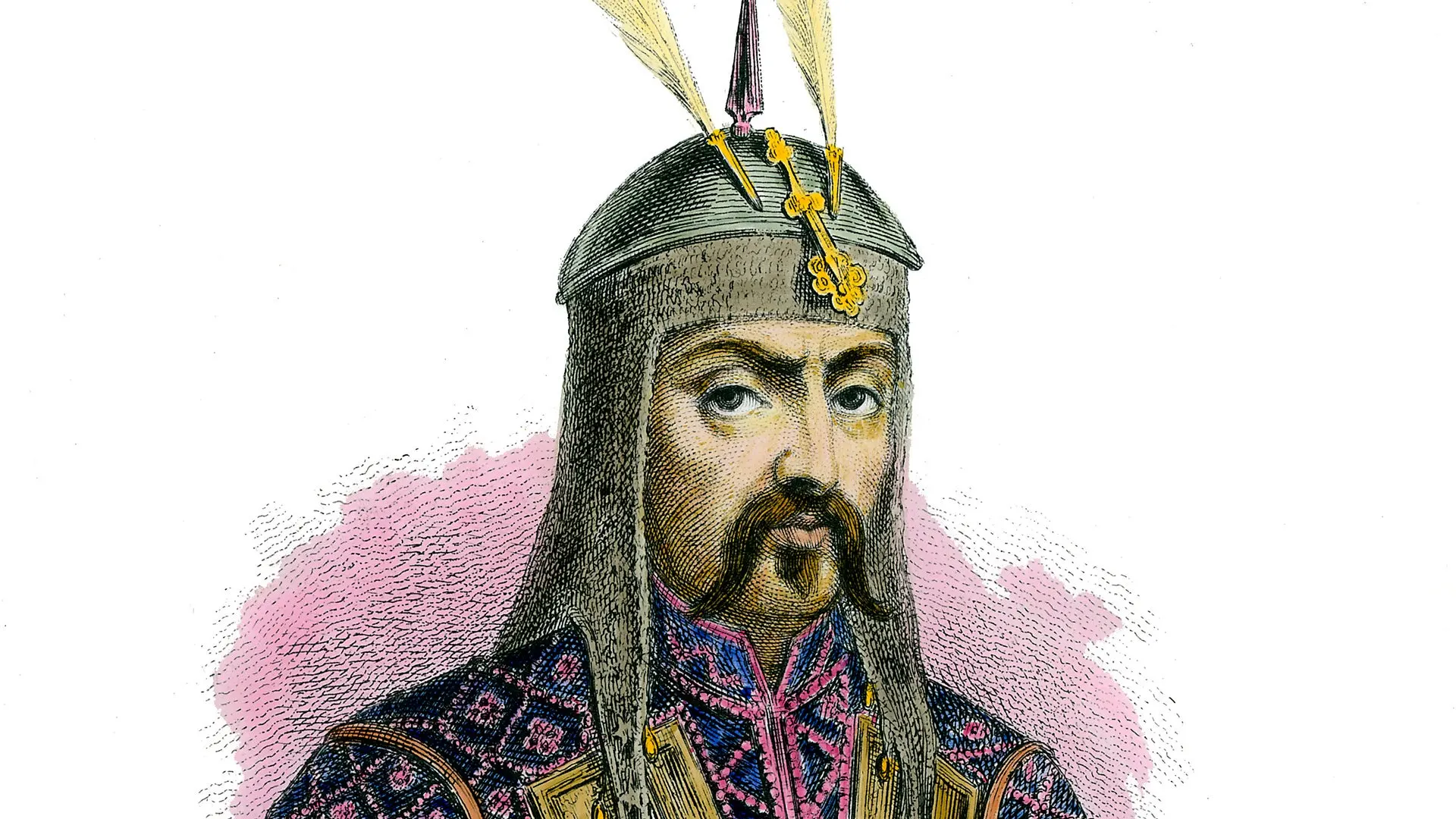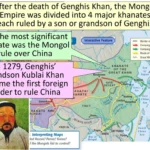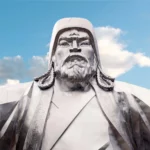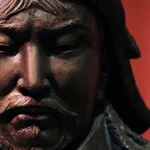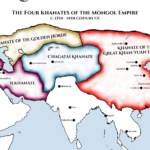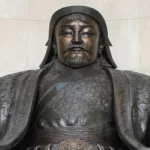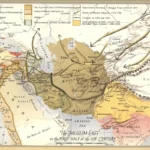Imagine stepping back in time to the vast Mongolian steppes, where the legendary Genghis Khan ruled with an iron fist. In this captivating article, we’ll peel back the layers of his enigmatic life, exploring his military prowess, empire-building strategies, and the lasting legacy he left on the world. Brace yourself for an epic journey into the heart of history, as we unravel the secrets of one of the most influential figures in human civilization.
Genghis Khan: The Rise and Conquest of a Mongolian Legend
Have you ever wondered about the man who once ruled an empire stretching from the Pacific to Europe? Meet Genghis Khan, a nomadic leader who forged a vast realm and left an indelible mark on history.
Early Life and the Making of a Legend
Born as Temüjin in a humble family, Genghis Khan’s life took an unexpected turn when tragedy struck. Amidst rivalry and upheaval, he proved to be a natural leader. By uniting the nomadic tribes under his banner, he created a formidable force that would shake the world.
The Mongol Empire’s Unstoppable Conquest
Under Genghis Khan’s command, the Mongol Empire expanded at an astonishing pace. His armies, known for their discipline and deadly archery, swept across vast territories, conquering lands from China to Persia. They left a trail of awe and fear in their wake.
Impact on History: A World Reshaped
The Mongol conquests reverberated throughout the world, leaving an undeniable impact:
- Political Transformations: Genghis Khan’s empire bridged East and West, facilitating trade and cultural exchange. It paved the way for the rise of new political entities, including the Yuan Dynasty in China.
- Cultural Exchange: The Mongols promoted literacy, religious tolerance, and the spread of new technologies. They fostered a vibrant exchange of ideas and innovations across Eurasia.
- Economic Boom: The Mongol Pax, a period of relative peace, spurred increased trade and economic prosperity along the legendary Silk Road.
Genghis Khan’s Enduring Legacy
Genghis Khan’s legacy remains complex and controversial. While he is often portrayed as a ruthless warlord, he also implemented social reforms, encouraged education, and embraced religious diversity. His conquests indelibly shaped the course of history, and his impact continues to resonate today.
Table: Genghis Khan’s Major Conquests
| Region | Year |
|---|---|
| Outer Mongolia | 1206 |
| Northern China | 1211 |
| Central Asia | 1218 |
| Persia | 1220 |
| Southern China | 1234 |
Are you curious about the enigmatic ruler who conquered vast swathes of land? Dive into Genghis Khan biography to unravel the life and conquests of this legendary figure. Discover how his ingenious Genghis Khan military tactics enabled him to build an empire that stretched from the Pacific to Eastern Europe. Explore the enduring Genghis Khan legacy and delve into the fascinating history of his vast Genghis Khan empire.
Military Strategies and Conquests
In the 13th century, the Mongol Empire’s dominance under the enigmatic Genghis Khan made waves across the world. Their unbeatable army and clever tactics allowed them to conquer land after land, changing the political map forever.
Behind the Mongol Conquests:
Genghis Khan’s secret weapon was his ability to unite different tribes, bringing their fighting skills together into one unstoppable force. They weren’t just good at fighting hand-to-hand, either – they had some serious tricks up their sleeves.
Their cavalry was the fastest in the game, letting them zip around the battlefield and outmaneuver their enemies. Then, their archers would let loose a storm of arrows, so accurate they could hit a target from miles away. And if that wasn’t enough, they’d split their troops into groups that would circle around their opponents, leaving them cornered and no way to escape.
But it wasn’t just their fighting skills that made them unstoppable. Genghis Khan knew how to scare his enemies. His army had a reputation for being brutal, and he’d even use scorched-earth tactics, burning cities and land to make his opponents give up before even getting into a fight.
The Legacy of Genghis Khan:
Genghis Khan’s conquests stretched from China to Eastern Europe, reaching as far as the gates of Hungary. He created one of the biggest and most powerful empires the world had ever seen.
His reign wasn’t just about conquest, though. He encouraged freedom of religion, made sure people could read and write, and even brought back new ideas and technology from the lands he conquered. He also created a period of peace and stability known as the Pax Mongolica, which made it easier for people to trade and travel across his vast empire.
Genghis Khan’s impact on world history is still debated today. Some see him as a ruthless conqueror, while others recognize his skills as a leader and his empire’s role in shaping the world we know today.
Impact on World History: Genghis Khan’s Legacy
Imagine a world without the Mongol Empire, its vast territories stretching across continents. It’s hard to fathom, but it could have been so different without the influence of a single man: Genghis Khan.
Genghis Khan’s rise to power was nothing short of extraordinary. He united warring tribes, laying the foundation for an empire that would dominate much of Eurasia. His conquests weren’t just brutal campaigns; they sparked a cultural revolution, connecting East and West like never before.
Key Impacts:
- United and Expanded: Genghis Khan transformed fragmented tribes into a formidable force, establishing the Mongol Empire as one of the world’s largest.
- Conquered Vast Territories: His armies swept across continents, capturing and controlling an area from Eastern Europe to China.
- Facilitated Trade and Cultural Exchange: Under his rule, the Silk Road became a hub of trade and cultural exchange, fostering economic growth and the spread of ideas.
- Legacy of Social Reforms: Genghis Khan introduced social reforms, including religious tolerance and education, which left a lasting mark on the societies he conquered.
- Pioneer of Modern Concepts: He implemented a census, postal system, and religious freedom, pioneering concepts that were revolutionary in their time.
Far-Reaching Consequences:
Genghis Khan’s empire paved the way for significant historical developments, including:
- Exchange of Ideas and Technology: His conquests facilitated the flow of knowledge and technology between East and West, leading to advancements in fields like astronomy, medicine, and mathematics.
- New Political Systems: The Mongol Empire inspired new political structures and administrative systems, shaping the governance models of many future empires.
- Cultural Diffusion: The blending of cultures under the Mongol Empire led to the spread of religious practices, art forms, and languages, creating a tapestry of diverse traditions.
While Genghis Khan’s military tactics were brutal, his legacy is a complex blend of chaos and innovation. He was a brilliant strategist and a visionary leader who left an enduring impact on world history, forever changing the political, economic, and cultural landscape of the globe.
Legacy and Historical Significance: Genghis Khan’s Enduring Impact
Genghis Khan, the mighty Mongol leader, was not just a relentless conqueror but a visionary who left a profound mark on the world. Here’s why his legacy continues to resonate:
Unifying the Mongolian Tribes: Before Genghis Khan, the Mongolian tribes were fragmented and often fought among themselves. He united them into a formidable force, creating a vast empire that stretched from Eastern Europe to Southeast Asia.
Military Prowess and Innovations: Genghis Khan was a brilliant military strategist known for his innovative tactics and brutal efficiency. His armies introduced new ways of warfare, including the use of gunpowder and lightning-fast cavalry charges.
Infrastructure and Governance: Despite his fearsome reputation, Genghis Khan was also a pragmatist who established a system of law and order within his empire. He built roads, postal systems, and codified laws to ensure stability.
Trade and Cultural Exchange: Genghis Khan’s conquests facilitated the movement of goods, ideas, and people between the East and West. The Mongol Empire became a melting pot of cultures, promoting trade and cultural exchange.
lasting Impact: Genghis Khan’s legacy extends far beyond his conquests. The Mongol Empire became a catalyst for the transmission of knowledge and technology, fostering global civilization and shaping the world we live in today.
Assessment of Legacy: Genghis Khan’s legacy is complex and often contradictory. While his military campaigns were marked by brutality, his reforms and innovations left a positive impact on society. He remains a controversial figure, but his undeniable impact on history cannot be ignored.
Key Characteristics of Genghis Khan’s Leadership:
| Characteristic | Description |
|---|---|
| Unifying Vision | United the nomadic tribes of Mongolia into a powerful empire |
| Military Brilliance | Introduced innovative tactics and led relentless campaigns |
| Strategic Pragmatism | Established a system of law, order, and infrastructure |
| Cultural Appreciation | Promoted trade and religious tolerance, facilitating cultural exchange |
| Enduring Influence | His conquests and reforms continue to shape the world today |
Conclusion: Genghis Khan was a complex and enigmatic figure who left an unforgettable mark on history. His conquests, innovations, and leadership qualities shaped the course of human civilization. While his legacy is multifaceted, his enduring impact remains undeniable, making him a timeless figure whose influence is still felt today.
FAQ
Q1: What were Genghis Khan’s key military strategies?
A1: Genghis Khan employed innovative strategies such as swift and coordinated attacks, superior cavalry skills, and siege warfare techniques. He also utilized psychological tactics, instilling fear in his opponents and encouraging their surrender.
Q2: How did Genghis Khan’s conquests impact global trade?
A2: Genghis Khan established trade routes and enforced peace along the Silk Road, facilitating unprecedented cultural and commercial exchange between the East and West. His empire promoted the flow of goods, ideas, and technologies, connecting diverse regions and fostering economic prosperity.
Q3: What was Genghis Khan’s impact on religious and cultural diversity?
A3: Despite his violent conquests, Genghis Khan fostered religious tolerance within his empire. He allowed followers of different faiths to practice their beliefs freely, including Buddhists, Muslims, and Christians. This fostered a melting pot of cultures and contributed to the empire’s intellectual and artistic achievements.
Q4: How did Genghis Khan’s leadership style shape the Mongol Empire?
A4: Genghis Khan’s leadership was characterized by a combination of ruthlessness and pragmatism. He maintained strict discipline and loyalty among his troops, demanding obedience and punishing dissent. However, he also recognized talent and rewarded merit, promoting capable individuals regardless of their background.
Q5: What are some of the lasting legacies of Genghis Khan’s empire?
A5: Genghis Khan’s empire left an enduring mark on the world. His conquests helped to spread Mongolian culture and language across vast territories. The empire’s political and administrative systems influenced subsequent dynasties and empires in Asia and Europe. Additionally, Genghis Khan’s military innovations continue to be studied and applied in modern warfare.
- Mastering Leader in Spanish: The Complete Guide - April 19, 2025
- Uncovering Surprising Parallels: England Size Compared to US States - April 19, 2025
- Old Mexico Map: Border Shifts 1821-1857 - April 19, 2025
